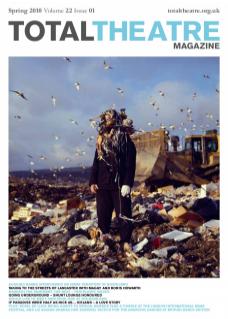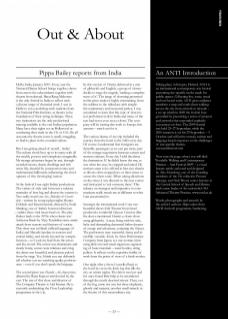Delhi, India, January 2010. Every year the National Drama School brings together shows from across the subcontinent together with theatre from abroad. Barat Rang Mahotsav is the only festival in India to reflect such a diverse range of theatrical work. I was in Delhi to run a workshop with students from the National Film Institute, as theatre is the foundation of their acting technique. These two institutions are the only professional training available to the vast Indian population. Many have their sights set on Bollywood or continuing their study in the UK or USA. By all accounts the theatre scene is small, struggling to find its place in the crowded culture.
But I am getting ahead of myself... India! The culture shock lives up to its name with all the wealth, poverty and complexity imaginable. My strange adventure began by taxi, through crowded streets, shanty dwellings and rich street life, dwarfed by construction sites and multinational billboards, influencing the development of this ‘developing’ nation.
At the festival I saw eight Indian productions. The variety of style and form was a salutary reminder of how big and diverse the country is. Two really stood out: Sex, Morality & Censorship – written by women playwrights Shanta Gokhale and Irawati Karnik, directed by Sunil Shanbag, one of India’s foremost directors – tackles these vital issues head on. The play flashes back to the 1970s when classic text Sakharam Binder by Vijay Tendulkar came under attack from censors and factions of society. This show was in Hindi (official language of India) and Marathi (spoken in western and central India), and mostly beyond my comprehension – so I took my lead from the actors and the crowd. The orator was charismatic and clearly funny, scenes were intimate and crisp, the dance was beautiful, and pleasure pulsed from the stage. Yes, I think you can definitely tell whether you are watching quality performance – even if you don’t speak the language.
The second piece was Hamlet – the clown prince, directed by Rajat Kapoor and devised by the cast. The star of this show and director of The Company Theatre is Atul Kumar. He is currently undertaking the Clore Leadership programme in the UK.
In this version of Hamlet, delivered in a mix of gibberish and English, a group of clowns decide to stage the tragedy, ‘making a complete mess of it’. The range of clowning presented in this piece makes it highly entertaining, from the sublime to the ridiculous with insightful commentary and measured pathos. I was astonished to learn that this type of clown is not performed at all in India and many of the cast had never even seen a clown. The company will be touring this work to Europe this autumn – watch out for it.
The curious drama of my trip included the journey from the hotel to the NSD every day. Of course I understand that foreigners are desirable passengers as we can pay more, part of the strange negotiation between eastern and western cultures. Every day I told the driver the destination. If he didn’t know the way, as was often the case, he stopped and asked. Directions seem to be offered in bite-size chunks as drivers often stopped two or three times to secure the short route. When asking directions on the street, I was directed to the next corner and instructed to ‘ask someone there’. This reliance on strangers and imperative to communicate really struck me as different to what I am accustomed to.
Amongst the international work I saw two beautiful shows; ISH Theater from Israel produced a wonderful Odysseus Chaoticus (like the above-mentioned Hamlet, a clown show using gibberish). A man, living with his wife, baby and demanding demented father dreams of escape and adventure, conjuring the Odyssey. The performers were masterful, funny and incredibly versatile. Kiosk, by Arica Performance Company from Japan, is a one-woman show using little text and much ingenious engineering of basic materials – water bottles, string pulleys. It reflects on the repetitive futility of work from the point of view of a kiosk worker.
One night after a show, I travelled back to the hotel by car in the thick fog that fills the city on winter nights. The driver was lost and for once found little help as he meandered through the nearly deserted streets. Then, out of the fog, came not one but three elephants, ghostly and majestic, another small miracle in the theatre of this extraordinary city.

